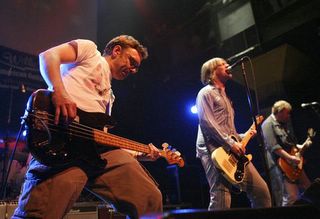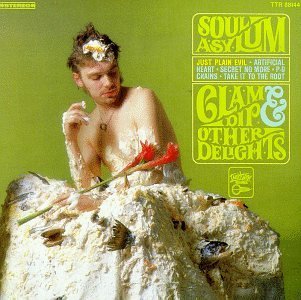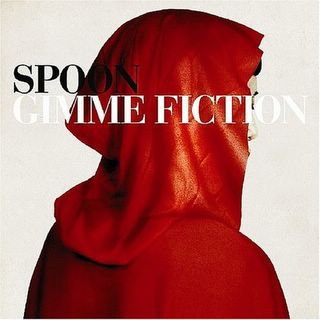
Over the two and a half years I've been doing the Song of the Week, no track has just missed the cut as much as this one. I've listened to both recordings of it many times for over two years, yet another song would always seem to raise its head up above it. After listening to it each day last week in anticipation of their show Friday night at Bowery Ballroom, I decided its time had come.
I first heard "I Wasn't Prepared" when it appeared on Eisley's debut EP, 2003's Laughing City. At the time I thought the piano-driven song was a nice and intriguing ballad, good enough to make it onto a mix of new stuff I made for a trip up to Boston in the fall of that year. I was pretty sure it was a sad song, most likely about lost love, even though I couldn't figure out what the heck the lyrics were about. Yet something seemed to be missing from the song, something I couldn't quite put my finger on.
The second time I heard it was this February when Eisley's full-length debut, Room Noises, was released. After one listen, I knew what was missing in its original recording--some road experience. In this version the playing was more confident, the harmonies between the two female singers were up from great to absolutely spine-tingling and the overall production finally matched the quality of the song. Quite simply, this new version of "I Wasn't Prepared" knocked me out. Of course, I had no idea how inexperienced the band was to begin with. As I read the bio that came with the disc, I was stunned to find out that these two great voices came from 20-year-old guitarist Sherri Dupree and 16-year-old keyboardist Stacy Dupree. So that's what they sounded a bit more experienced two years later.
The whole Eisley story is truly fascinating: The Tyler, Texas band consists of four siblings (along with one close friend) who were home-schooled by their parents; the group got off the ground when the other guitar-playing sister Chauntelle at the age of 14 (she's now 22) discovered Radiohead's OK Computer; the band played their first gigs in Christian bookstores; and they took their name from a space port in the original Star Wars. It's amazing to me that more music magazines haven't written about how crazy it is that this band got discovered by Coldplay's management and got signed to a major label.
Back at the end of March Moria the concert pal and I went to see Eisley open for New Found Glory at that hell hole Webster Hall. I must admit I was nervous going in because I thought the Dupree girls' harmonies were somehow manufactured in the studio. After one song, I knew that wasn't the case. And when they did "I Wasn't Prepared," I got another surprise--these two traded off verses during the song. And oh, they sang it so well and sounded so sad I was genuinely moved. (And then genuinely felt like a dirty old man thinking how young they are.)
Friday the concert pal and I checked out Eisley's first headline show in New York, and once again "I Wasn't Prepared" was the highlight of the set. And yet, even after all the times I have listened to the album version (31 times by my Itunes count) and the original EP version, I still don't understand these lyrics:
"Oh, when the day is blue
I'll sit here wondering about you
and how the pollen fell
All around your face in strange yellow patterns
But, I wasn't prepared for this
Oh, I wasn't prepared for this
When the morning came
The bees flew down and
Wrapped themselves around me
and that's when i spoke the word
To have them trace your face for me in pollen
But, I wasn't prepared for this
Oh, I wasn't prepared for this
Come, come back to me, my, my darling
Come, come back to me, my, my darling
I wasn't prepared for this
Oh, I wasn't prepared for this
When the day is blue
I'll sit here wondering about you"
They're sad--that's obvious. So was the subject of the song taken away by bees? Are these two young girls afraid of bees? Aren't these girls a bit young to be writing such great songs? And why do I like a band that I am old enough (seriously) to be their father? I wasn't prepared to feel this old.



